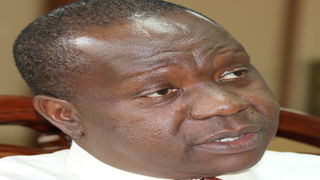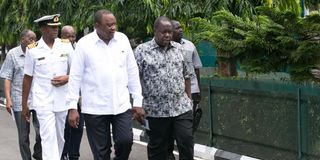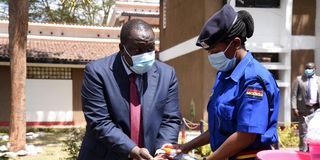
CS Fred Matiang'i.
| William Oeri | Nation Media GroupPremium
Inside the mind of Uhuru's right-hand man
What you need to know:
- Interior Cabinet Secretary Fred Matiang'i has authority to chair a Cabinet committee of basically all the ministers.
- Uhuru Kenyatta's "super minister" calls the shots as the DP remains isolated.
“The potential of our country is enormous. Unless we make mistakes, in 50 years we shall be a strong, middle income economy, the Singapore of Africa.”
We are sitting outside in the sun, appropriately socially distanced, cameras and aides around us and having a discussion about development, geopolitics, democracy, discipline and order, Covid-19 and the fact that Dr Fred Okengo Matiang’i never smiles in public.
“People only see one side of me in public. Those who know me in private will be surprised (by the suggestion that I don’t smile).”
We have come to speak to Dr Matiang’i for the same reason that every reporter and every observer of Kenyan politics would be sitting here: if the Jubilee government of President Uhuru Kenyatta and Deputy President William Ruto were a family and Mr Kenyatta was one spouse and Mr Ruto the other, while Interior minister Dr Matiang’i was a friend, just a friend, of Mr Kenyatta’s, there are reasonable grounds for Mr Ruto to urgently request the intervention of the family pastor, the bishop even, and also spend some time with a good family lawyer in anticipation of divorce.

Fred Matiang'i and Deputy President William Ruto at Nairobi School in 2016.
In the view of many observers, this is the man who is eating Mr Ruto’s lunch.
The government, during its second term, is structured in a totally different manner. The partnership between the United Republican Party and The National Alliance has gone the way of the dodo and the political bromance between Mr Kenyatta and Mr Ruto is like a fire that has consumed itself out: if you drive your hand into the ashes, you need a high degree of sensitivity to detect the slightest whiff of warmth.
The reasons for that breakdown are a story for another day. And while there are no permanent friends or enemies in politics, the partnership between the two men has been reduced to public civility and the maintenance of appearances. It is amazing the gulf between the optics and reality of Kenyan politics.
Enter Dr Matiang’i. Executive order No 1 of 2019 is very important in the recreation of the Jubilee government in its second term and the evolution of the so-called administrative State.
In that document, Mr Kenyatta appointed Dr Matiang’i to coordinate all government development projects and to handle the communication in respect of those projects. He took the Presidential Delivery Unit and placed it under Dr Matiang’i.

CS Matiang'i and President Kenyatta at State House, Mombasa in January.
With his command of the provincial administration and the internal security organs sitting at his Harambee House office, Dr Matiang’i has visibility of the entire country and its development process, from the cities to the humblest of hamlets.
With authority to chair a Cabinet sub-committee of basically all the ministers, the Executive Order created in Dr Matiang’i the most powerful person, at least administratively, outside of State House.
“I have had an amazing experience chairing the Cabinet committee,” he says and enthusiastically launches into a long list of achievements, from roads to boreholes in slums. According to the way he tells it, by having each ministry present to defend its projects before other Cabinet Secretaries, the projects are better thought-out and more realistic in cost.
A rider is called for here. Power in complex systems is a very relative term. There are Cabinet secretaries who have power because of their chemistry and relations with the President and there are offices that enjoy the absolute trust of the Head of State and, therefore, whose influence is not seen during the day and is not dependent on the normal operations of government. And there are those who have no formal office but who act as an extension of the presidential brain.
Conspicuously missing
On February 3, 2020, the President boarded his modest Fokker at the Jomo Kenyatta International Airport Presidential Pavilion headed to Washington, DC for the Annual Prayer Breakfast. Assembled to say goodbye were Dr Matiang’i, Defence Cabinet Secretary Monica Juma, General Samson Mwathethe, then-Chief of Kenya Defence Forces and service commanders, among other worthies.
Conspicuously missing from the line-up was the Deputy President. After shaking hands with his usual gusto, the President headed up the stairs, having explicitly left Dr Matiang’i in charge. And off he went, according to three sources with knowledge of government matters.
At 5am on February 4, 2020, Baringo Senator Gideon Moi placed an important, terrible call to Dr Matiang’i. His father, Kenya’s second President, Daniel arap Moi, was no more.
Mr Kenyatta was determined to give Moi, who had been ailing for a long time, a send-off befitting a Head of State. It was Mr Moi in 2002 who fished Mr Kenyatta out of relative obscurity and made him Kanu’s presidential candidate.

Interior CS Fred Matiang'i with Foreign Affairs PS Macharia Kamau (left) and Interior Principal Secretary Karanja Kibicho at Nyayo Stadium in February 2020 when the requiem mass for former President Daniel Moi was held.
On top of Moi deserving a State funeral as a former Head of State, there was also plenty of history and loyalty between the two families. The whole thing had been planned to the smallest detail – from the proclamation of death to the formal handing over of the former Commander-in-Chief’s body to the military and the final interment at the Hero’s Corner in Lang’ata or Kabarak, whichever the family, and Mr Moi, chose. The former President had wanted to be buried next to his wife, Lena Moi.
It fell on Dr Matiang’i to assemble military and security chiefs at Nairobi Hospital. There, a conference room was commandeered to act as the headquarters of the team. At the time, the President was still in the air but the carefully laid plan kicked into full gear, the sources told the Nation.
The body was handed over to the military and taken to Lee Funeral Home, the family was given the lead in breaking the bad news to the country. Once the former Commander-in-Chief was in the hands of the military, armed forces rituals, protocols and procedures reigned. Throughout the mourning and finally the funeral, Dr Matiang’i was the President’s right-hand man, deputising for him and personally inspecting preparations to ensure that everything worked right.
Power shift
Though Dr Matiang’i’s office would not comment on these goings-on, the Nation’s legions of contacts confirm what the public has all along suspected: the cogs of power have shifted in Jubilee.
There are two schools of thought. There are those who believe that some people have taken the chisel to the DP’s kneecaps and politically and administratively isolated him.
Then there are those who argue that the DP’s position is constitutional; it is within his power to summon all government officials and take over the operations of government whenever the President is away. Whichever school you buy into, the inescapable fact is that this is not the first term; things are way different.
The question is, who is the real Dr Matiang’i? What is his thought process and how suited is he for the elevated responsibilities he now bears? What is his contribution to the country’s bench strength? What does democracy mean to the security minister and what is the place of human rights in his values? What is his assessment of how Kenya is managed and what does he see as an appropriate approach to filling the gaps?

Interior CS Fred Matiang’i and an officer at Buru Buru Police Station in Nairobi early this month.
Given the favouritism and corruption in the government, hasn’t the social contract between the people, to whom all power belongs, and the government been repudiated so that rather than the government serving the people, it is the people who are serving the government with their taxes, blood and sweat and doesn’t this potentially create revolutionary conditions? From a geopolitical perspective, what is the future of our country in this unstable and complex region?
We rocked up for the interview with John Kamau, the bipolar gearbox of my 16-year-old car providing me with lots of entertainment – and a thin film of sweat on the collar – in low gear.
The security minister is usually the fist of any regime, the manager of the state’s monopolised violence and it is unrealistic to expect such a person to be a wilting liberal. And Dr Matiang’i has had his fair share of controversy: the confrontation with the media during the digital migration, the establishment of the Government Advertising Agency, an unpopular agency to many journalists, the switching off of TV and radio stations during the mock swearing-in of Nasa leader Raila Odinga in January 2018, the arrests and crackdown on the so-called National Resistance Movement, the Ruai and Kariobangi evictions as well as the frequent deaths of civilians at the hands of police.
“Our intelligence gathering is now 10 times better,” he says of the reduction in terror attacks. “We have re-tooled and reorganised the security sector.”
Dr Matiang’i was ebullient, as he always is, in private. He had taken the precaution of covering himself in a velvet carpet of media advisers.
A two-hour interview before TV cameras is probably the wrong forum for a subtle examination of an interviewee’s mind and it was quite clear that Dr Matiang’i was in a difficult place in terms of being critical and outspoken about the government which he coordinates.
He’s at great pains to be a good leader, to publicly take the hit and be protective of those he leads and he is touchingly devoted to Mr Kenyatta.
On the positive side, his biggest asset is that he is obviously very effective at getting things done and squeezing results out of the people he supervises. From this administrative perspective, he probably has few equals in the Cabinet.
And, as a scholar, he is a clever and articulate fellow with a sophisticated understanding of the theory of government and rather sharp political instincts; the way he succeeds in not allowing his ambitions to peep from under the blanket of humility shows he has a future in politics.
“You can’t put everything in the Constitution. And how many people can you take to court? As citizens, we don’t have to be supervised to do the right thing,” he argues, explaining his understanding of democracy as “ethical living and being conscious of the other”. “I am the leader but I have to listen and incorporate what people say.”
But it is also quite obvious that he is still getting used to the saddle of power, is not given to public introspection and is at a stage in his career where he does not have the full luxury of his views.
It might be premature for the people of South Nyanza to measure to fit the inauguration dresses, but this is certainly one to watch.





